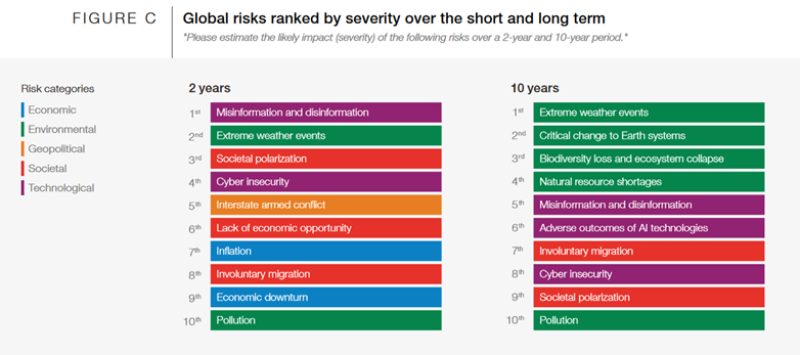Highlights:
The Global Risks Report 2024 presents the findings of the Global Risks Perception Survey (GRPS), which captures insights from nearly 1,500 global experts. The report analyses global risks through three time frames to support decision-makers in balancing current crises and longer-term priorities.
Chapter 1 explores the most severe current risks, and those ranked highest by survey respondents, over a two-year period, analysing in depth the three risks that have rapidly accelerated into the top 10 rankings over the two-year horizon.
Chapter 2 focuses on the top risks emerging over the next decade against a backdrop of geostrategic, climate, technological and demographic shifts, diving deeper into four specific risk outlooks.
The report concludes by considering approaches for addressing complex and non-linear aspects of global risks during this period of global fragmentation.
Environmental risks continue to dominate the risks landscape over all three time frames. Two-thirds of GRPS respondents rank Extreme weather as the top risk most likely to present a material crisis on a global scale in 2024 (Figure B), with the warming phase of the El Niño-Southern Oscillation (ENSO) cycle projected to intensify and persist until May this year. It is also seen as the second-most severe risk over the two-year time frame and similar to last year’s rankings, nearly all environmental risks feature among the top 10 over the longer term (Figure C).
The Cost-of-living crisis remains a major concern in the outlook for 2024 (Figure B). The economic risks of Inflation (#7) and Economic downturn (#9) are also notable new entrants to the top 10 risk rankings over the two-year period (Figure C). Although a “softer landing” appears to be prevailing for now, the near-term outlook remains highly uncertain.
As both a product and driver of state fragility, Interstate armed conflict is a new entrant into the top risk rankings over the two-year horizon (Figure C).


Chapter 1.5: Economic uncertainty analyses the multiple sources of continued supply-side price pressures looming over the next two years, from El Niño conditions to the potential escalation of live conflicts. It shows that if interest rates remain relatively high for longer, small- and medium- sized enterprises and heavily indebted countries will be particularly exposed to debt distress.
Chapter 1.4: Rise in conflict highlights that, as the focus of major powers becomes stretched across multiple fronts, conflict contagion is a key concern. There are several frozen conflicts at risk of heating up in the near term, due to spillover threats or growing state fragility.
Chapter 2.3: A 3°C World explores the consequences of passing at least one “climate tipping point” within the next decade. Recent research suggests that the threshold for triggering long-term, potentially irreversible and self- perpetuating changes to select planetary systems is likely to be passed at or before 1.5°C of global warming, which is currently anticipated to be reached by the early 2030s. Many economies will remain largely unprepared for “non-linear” impacts: the potential triggering of a nexus of several related socioenvironmental risks has the potential to speed up climate change, through the release of carbon emissions, and amplify related impacts, threatening climate-vulnerable populations. The collective ability of societies to adapt could be overwhelmed, considering the sheer scale of potential impacts and infrastructure investment requirements, leaving some communities and countries unable to absorb both the acute and chronic effects of rapid climate change.
Chapter 3 shows that localized strategies, breakthrough endeavours, collective actions and cross-border coordination all play a part in addressing these risks.
| Geographic coverage | Global |
| Originally published | 02 Feb 2024 |
| Related organisation(s) | WEF - World Economic Forum |
| Knowledge service | Metadata | Global Food and Nutrition Security | Food crises and food and nutrition security | Climate extreme |
| Digital Europa Thesaurus (DET) | climate changerisk managementinflationdigital technologyConflict |
